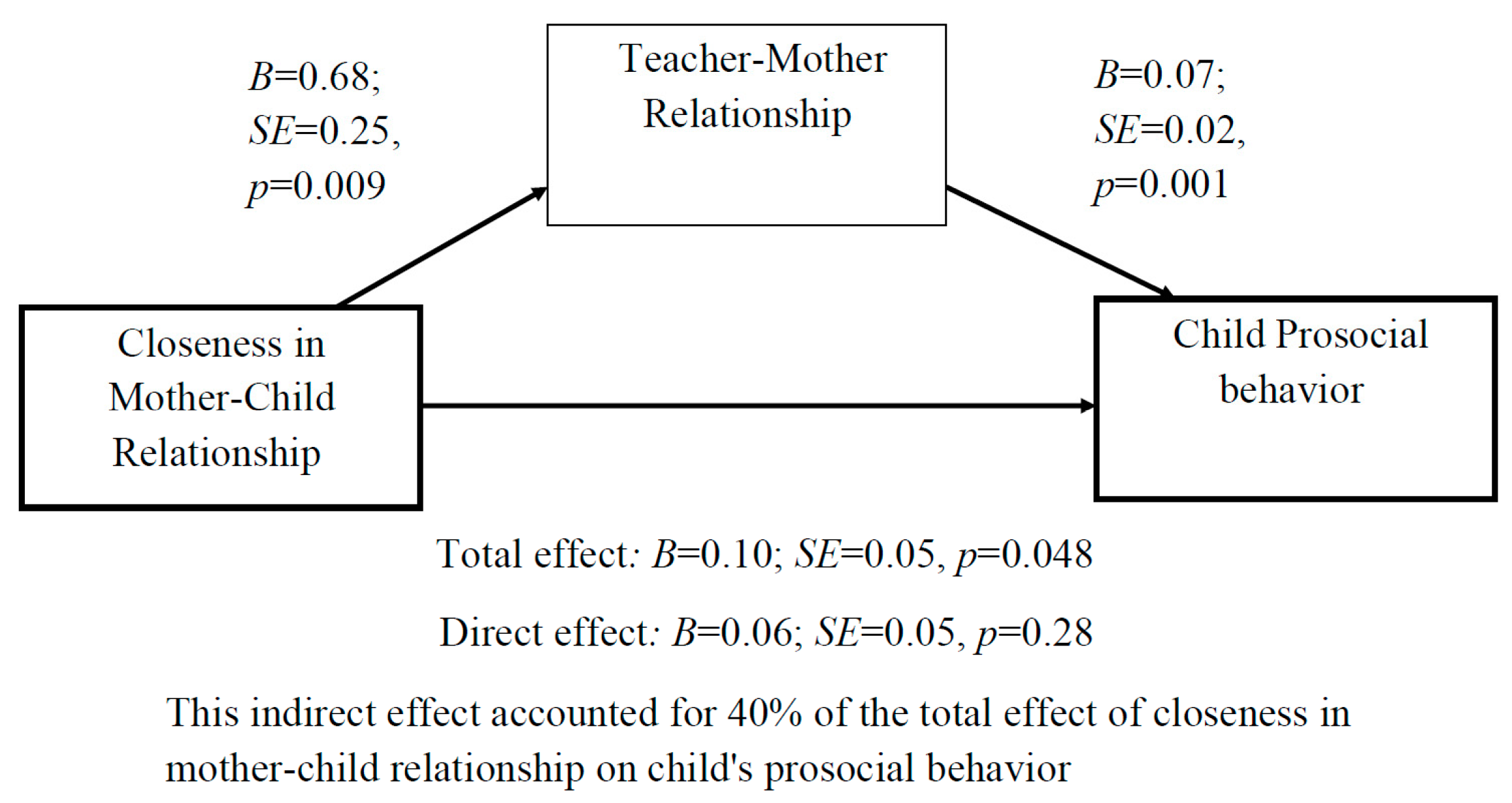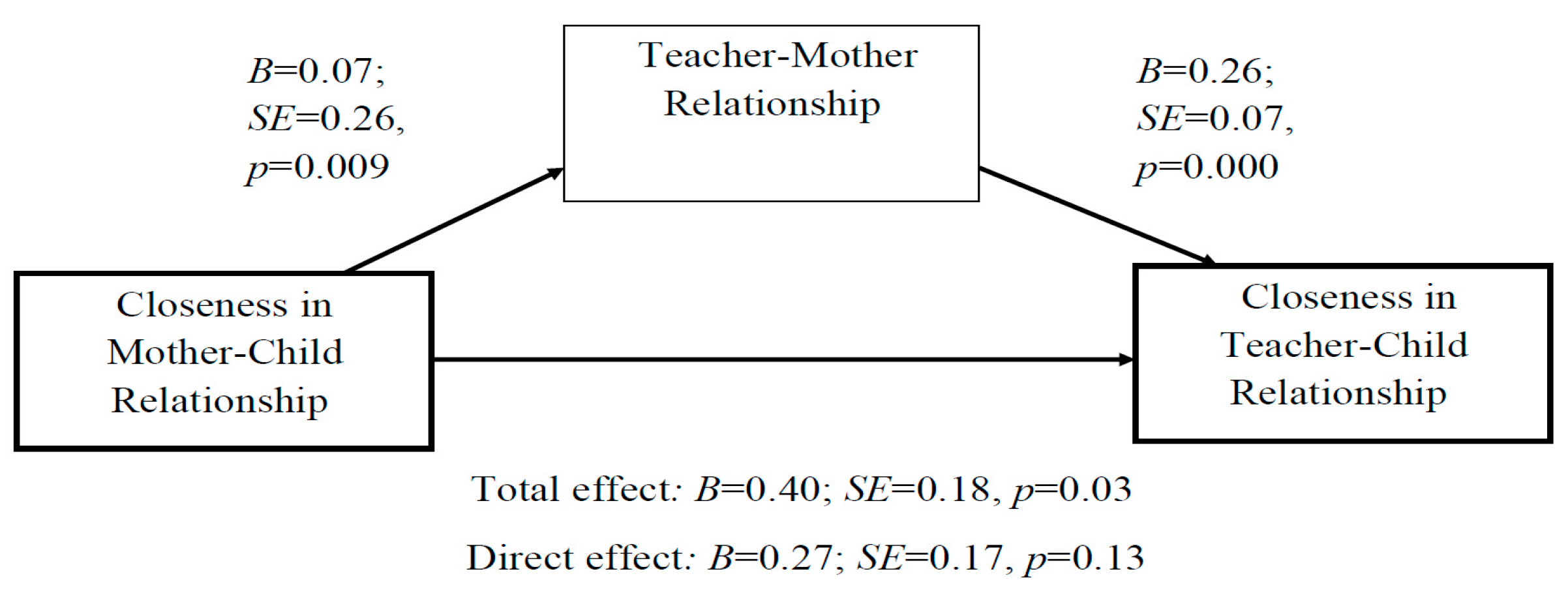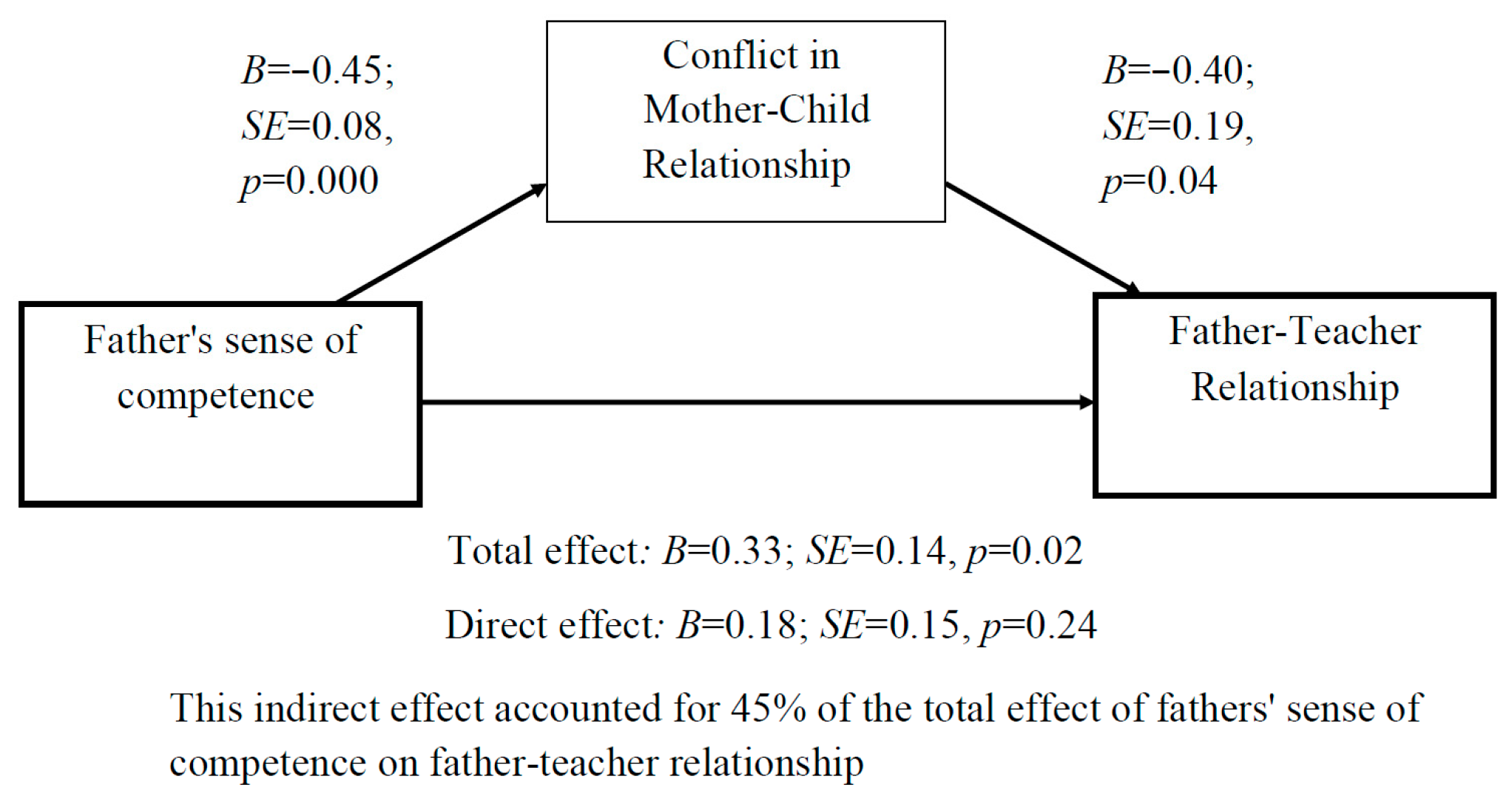The Child–Mother–Father–Teacher Relationship Network in Kindergarten and Its Association with Children’s Social and Academic Development: An Ecological Perspective
Abstract
:1. Introduction
1.1. Theoretical Framework: Ecological Systems Theory, Networked Model, and Attachment Theory
1.2. Mother–Child and Father–Child Relationship: Two Unique Relationship Systems?
1.3. Parent–Teacher Relationship
1.4. Expected Outcomes: Prosocial and Learning Behaviors
1.5. The Current Study
2. Materials and Methods
2.1. Participants and Procedure
2.2. Measures
2.2.1. Parental–Teacher Relationship
2.2.2. Adult–Child Relationship
2.2.3. Teacher Rating of Children’s Behavior in Kindergarten
2.2.4. Control and Background Variables
3. Results
3.1. Preliminary Analyses
3.2. Main Analyses
4. Discussion
4.1. Mothers and Fathers: Differences in Associations with Teacher–Child Relationship, Parent–Teacher Relationships, and Child’s Adjustment in Kindergarten
4.2. Mothers and Fathers: Different Subsystems in Parent–Teacher Relationships
4.2.1. Mother-and-Teacher Subsystem
4.2.2. Father-and-Teacher Subsystem
4.3. Limitations
5. Conclusions
Author Contributions
Funding
Institutional Review Board Statement
Informed Consent Statement
Data Availability Statement
Acknowledgments
Conflicts of Interest
References
- Epstein, J.L. School and Family Partnerships: Preparing Educators and Improving Schools; Westview Press: Boulder, CO, USA, 2001. [Google Scholar]
- Bronfenbrenner, U. The Ecology of Human Development: Experiments by Nature and Design; Harvard University Press: Cambridge, MA, USA, 1979. [Google Scholar]
- Rimm-Kaufman, S.E.; Pianta, R.C. An ecological perspective on the transition to kindergarten: A theoretical framework to guide empirical research. J. Appl. Dev. Psychol. 2000, 21, 491–511. [Google Scholar] [CrossRef]
- Cabrera, N.J.; Fitzgerald, H.E.; Bradly, R.H.; Roggman, L. The ecology of father-child relationships: An expanded model. J. Fam. Theory Rev. 2014, 6, 336–354. [Google Scholar] [CrossRef]
- Van Greet, P.L. Dynamic systems, process and development. Hum. Dev. 2019, 63, 153–179. [Google Scholar] [CrossRef] [Green Version]
- Neal, J.W.; Neal, Z.P. Nested or networked? Future directions for ecological systems theory. Soc. Dev. 2013, 22, 722–737. [Google Scholar] [CrossRef]
- Bowlby, J. Attachment and Loss: Vol. 1. Attachment, 2nd ed.; Basic Books: New York, NY, USA, 1982. [Google Scholar]
- Gross, J.T.; Stren, J.A.; Brett, B.E.; Cassidy, J. The multifaceted nature of prosocial behavior in children: Links with attachment theory and research. Soc. Dev. 2017, 26, 661–678. [Google Scholar] [CrossRef]
- Morrison, E.F.; Rimm-Kauffman, S.; Pianta, R.C. A longitudinal study of mother- child interactions school entry and social and academic outcomes in middle school. J. Sch. Psychol. 2003, 41, 185–200. [Google Scholar] [CrossRef]
- Deneault, A.A.; Bakermans-Kranenburg, M.J.; Groh, A.M.; Fearon, P.R.; Madigan, S. Child-father attachment in early childhood and behavior problems: A meta-analysis. New Dir. Child Adolesc. Dev. 2021, 2021, 43–66. [Google Scholar] [CrossRef]
- Ferreira, T.; Cadima, J.; Matias, M.; Vieira, J.M.; Leal, T.; Matos, P.M. Preschool children’s prosocial behavior: The role of mother-child, father-child and teacher-child relationships. J. Child Fam. Stud. 2016, 25, 1829–1839. [Google Scholar] [CrossRef] [Green Version]
- Rodrigues, M.; Sokolovic, N.; Madigan, S.; Luo, Y.; Sliva, V.; Misra, S.; Jenkins, J. Paternal sensitivity and children’s cognitive and socioemotional outcomes: A meta-analytic review. Child Dev. 2021, 92, 554–577. [Google Scholar] [CrossRef] [PubMed]
- Arbel, R.; Sofri, I.; Elizarov, E.; Ziv, Y. Preschool children’s social information processing mediates the link between the quality of the parent-child relationship and the child’s learning difficulties. Int. J. Environ. Res. Public Health 2021, 18, 1972. [Google Scholar] [CrossRef] [PubMed]
- Ziv, Y.; Arbel, R. Parenting practices, aggressive response evaluation and decision, and social difficulties in kindergarten children: The role of fathers. Aggress. Behav. 2021, 47, 148–160. [Google Scholar] [CrossRef] [PubMed]
- Dagan, O.; Schuengel, C.; Verhage, M.L.; van Ijzendoorn, M.H.; Sagi-Schwartz, A.; Madigan, S.; Duschinsky, R.; Roisman, G.I.; Bernard, K.; Bakermans-Kranenburg, M.; et al. Configurations of mother-child and father-child attachment as predictors of internalizing and externalizing behavioral problems: An individual participant data (IPD) meta-analysis. New Dir. Child Adolesc. Dev. 2022, 2021, 67–94. [Google Scholar] [CrossRef] [PubMed]
- Paquette, D.; Gagon, C.; Macario de Medeiros, J. Fathers and the activation relationship. In Handbook of Fathers and Child Development; Fitzgerald, H., von Klitzing, K., Cabrera, N.J., Scarano de Mendonca, J., Skjothaug, T., Eds.; Springer: Cham, Switzerland, 2020; pp. 291–313. [Google Scholar] [CrossRef]
- Christenson, S.L. Families, educators, and the family-school partnership: Issues or opportunities for promoting children’s learning competence? In Proceedings of the Future of School Psychology, Indianapolis, IN, USA, 14 November 2002. [Google Scholar]
- Galindo, C.; Sheldon, S. School and home connections and children’s kindergarten achievement gains: The mediating effects of family involvement. Early Child. Res. Q. 2012, 27, 90–103. [Google Scholar] [CrossRef]
- Mendez, J.L. How can parents get involved in preschool? Barriers and engagement in education by ethnic minority parents of children attending Head Start. Cult. Divers. Ethn. Minor. Psychol. 2010, 16, 26–36. [Google Scholar] [CrossRef] [Green Version]
- O’Connor, E. Teacher-child relationships as dynamic systems. J. Sch. Psychol. 2010, 48, 187–218. [Google Scholar] [CrossRef]
- Iruka, I.U.; Winn, D.C.; Kingsley, S.J.; Orthodoxou, Y.J. Links between parent-teacher relationships and kindergartners’ social skills: Do child ethnicity and family income matter? Elem. Sch. J. 2011, 111, 387–408. [Google Scholar] [CrossRef]
- Lang, S.N.; Jeon, L.; Schoppe-Sullivan, S.J.; Wells, M.B. Associations between parent- teacher cocaring relationships, parent-child relationships, and young children’s social emotional development. Child Youth Care Forum 2020, 49, 623–646. [Google Scholar] [CrossRef]
- Jeon, H.J.; McCartney, M.C.; Richard, V.; Johnson, S.J.; Kwon, K.A. Associations between parent-teacher and teacher-child relationships and children’s socioemotional functioning. Early Child Dev. Care 2021, 191, 2407–2421. [Google Scholar] [CrossRef]
- Janssen, J.; Spruyt, B.; Vandenbroeck, M. Is everybody happy? Exploring the predictability of parent satisfaction with childcare in Flanders. Early Child. Res. Q. 2021, 55, 97–106. [Google Scholar] [CrossRef]
- Mikolajewski, A.J.; Chavarria, J.; Moltisanti, A.; Hart, S.A.; Taylor, J. Examining the factor structure and etiology of prosociality. Psychol. Assess. 2014, 26, 1259. [Google Scholar] [CrossRef] [Green Version]
- Caprara, G.V.; Barbaranelli, C.; Pastorelli, C.; Bandura, A.; Zimbardo, G. Prosocial foundations of children’s academic achievement. Psychol. Sci. 2000, 11, 302–306. [Google Scholar] [CrossRef]
- Ziv, Y. Social information processing patterns, social skills, and school readiness in preschool children. J. Exp. Child Psychol. 2013, 114, 306–320. [Google Scholar] [CrossRef] [Green Version]
- Tur-Porcar, A.M.; Domenech, A.; Mestre, V. Family linkages and social inclusion. Predictors of prosocial behavior in childhood. An. De Psicol. 2018, 34, 340. [Google Scholar] [CrossRef]
- Hu, B.Y.; Wu, Z.; Winsler, A.; Wu, Y.; Fan, X. Teacher-child interaction and preschoolers’ learning behavior in China; A piecewise growth model. Early Educ. Dev. 2021, 32, 677–694. [Google Scholar] [CrossRef]
- Mashburn, A.J.; Pianta, R.C. Social relationships and school readiness. Early Educ. Dev. 2006, 17, 151–176. [Google Scholar] [CrossRef]
- Edwards, C.P.; Sheridan, S.M.; Knoche, L. Parent-child relationships in early learning. In International Encyclopedia of Education; Baker, E., Peterson, P., McGaw, B., Eds.; Elsevier: Oxford, UK, 2010; Volume 5, pp. 436–443. [Google Scholar]
- Cliford, D.; Bryant, D.; Burchinal, M.; Barbarin, O.; Early, D.; Howes, C.; Pianta, R.; Winton, P. National Center for Early Development and Learning Multi-State Study of Pre-Kindergarten, 2001–2003; Questionnaires, U.S.: San Mateo, CA, USA, 2005. [Google Scholar]
- Adams, K.S.; Christenson, S.L. Trust and family-school relationship examination of parent-teacher differences in elementary and secondary grades. J. Sch. Psychol. 2000, 38, 477–497. [Google Scholar] [CrossRef]
- Pianta, R.C. STRS Student-Teacher Relationship Scale: Professional Manual; Psychological Assessment Resources: Lutz, FL, USA, 2001. [Google Scholar]
- Pianta, R.C. Child-Parent Relationship Scale; Unpublished Measure; University of Virginia: Charlottesville, VA, USA, 1992; p. 427. [Google Scholar]
- Goodman, R. The strengths and difficulties questionnaire: A research note. J. Child Psychol. Psychiatry 1997, 38, 581–586. [Google Scholar] [CrossRef]
- McDermott, P.A.; Leigh, N.M.; Perry, M.A. Development and validation of the preschool learning behaviors scale. Psychol. Sch. 2002, 39, 353–365. [Google Scholar] [CrossRef]
- Johnston, C.; Mash, E.J. A measure of parenting satisfaction and efficacy. J. Clin. Child Psychol. 1989, 18, 167–175. [Google Scholar] [CrossRef]
- Fisher, Y.; Fridman, Y. The parents and the school: Attitude and level of involvement, a self-report questionnaire for parents. In Research Tools Series; Henrietta Szold Institute: Jerusalem, Israel, 2003. [Google Scholar]
- Conduct Problems Prevention Research Group. Technical Reports for the Construct Development for the Measures for Year 2 Outcome Analyses. Unpublished Technical Report. 1995.
- IBM Corp. IBM SPSS Statistics for Windows, Version 27.0; IBM Corp: Armonk, NY, USA, 2020. [Google Scholar]
- Kenny, D.A. Mediation. UpToDate. 2021. Available online: https://davidakenny.net/cm/mediate.htm (accessed on 18 September 2022).
- Pianta, R.C.; Nimez, S.L. Relationships between children and teachers: Association with classroom and home behavior. J. Appl. Dev. Psychol. 1991, 12, 379–393. [Google Scholar] [CrossRef]
- Lewis, C.; Lamb, M.E. Fathers’ influences on children’s development: The evidence from two-parent families. Eur. J. Psychol. Educ. 2003, 18, 211–228. [Google Scholar] [CrossRef]
- Paquette, D. Theorizing the father-child relationship: Mechanisms and developmental outcomes. Hum. Dev. 2004, 47, 193–219. [Google Scholar] [CrossRef]
- Nur, I.; Aktas-Arnas, Y.; Abbak, B.S.; Kale, M. Mother-child and teacher-child relationships and their associations with school adjustment in pre-school. Educ. Sci. Theory Pract. 2018, 18, 201–220. [Google Scholar] [CrossRef] [Green Version]
- Pianta, R.C.; Nimetz, S.L.; Bennett, E. Mother-child relationships, teacher-child relationships and school outcomes in preschool and kindergarten. Early Child. Res. Q. 1997, 12, 263–280. [Google Scholar] [CrossRef]






| Possible Min–Max | Actual Min–Max | M | SD | M-PSOC | F-PSOC | M-IP | F-IP | |
|---|---|---|---|---|---|---|---|---|
| M-C Relationship | ||||||||
| M-C Closeness | 11–55 | 35–54 | 45.41 | 4.17 | 0.35 ** | 0.21 | 0.36 ** | 0.30 ** |
| M-C Conflict | 13–65 | 11–50 | 26.02 | 7.36 | −0.49 *** | −0.35 ** | −0.22 * | −0.32 ** |
| M-C Dependence | 6–30 | 7–26 | 15.40 | 3.80 | −0.19 | −0.11 | −0.03 | −0.11 |
| F-C Relationship | ||||||||
| F-C Closeness | 11–55 | 19–54 | 43.11 | 5.93 | 0.21 * | 0.46 *** | 0.24 * | 0.28 ** |
| F-C Conflict | 13–65 | 4–47 | 26.40 | 8.02 | −0.21 * | −0.49 *** | −0.12 | −0.25 ** |
| F-C Dependence | 6–30 | 6–24 | 15.54 | 3.80 | −0.09 | 0.04 | 0.02 | −0.10 |
| T-C Relationship | ||||||||
| T-C Closeness | 11–55 | 14–55 | 41.75 | 7.21 | 0.12 | 0.03 | 0.08 | 0.09 |
| T-C Conflict | 12–60 | 3–38 | 15.44 | 5.01 | −0.11 | −0.16 | −0.32 ** | −0.30 ** |
| T-C Dependence | 5–25 | 5–21 | 8.15 | 2.82 | −0.01 | 0.02 | −0.08 | −0.13 |
| Mother with Teacher | 078 | 33–82 | 70.57 | 10.16 | 0.17 | −0.05 | 0.21 * | 0.04 |
| Father with Teacher | 0–78 | 20–81 | 63.86 | 13.32 | 0.32 ** | 0.24 * | 0.16 | 0.30 ** |
| Teacher with Mother | 0–72 | 22–77 | 65.67 | 10.22 | 0.12 | 0.10 | 0.26 * | 0.09 |
| Teacher with Father | 0–72 | 3–77 | 59.09 | 12.31 | 0.25 * | 0.02 | 0.12 | 0.08 |
| Learning Behavior | 0–58 | 11–58 | 46.87 | 9.03 | 0.11 | 0.20 | 0.14 | 0.16 |
| Prosocial Behavior | 0–10 | 1–10 | 7.74 | 2.14 | 0.08 | 0.15 | 0.23 * | 0.10 |
| M-PSOC | 17–102 | 54–92 | 75.60 | 8.22 | − | 0.50 *** | 0.24 * | 0.18 |
| F-PSOC | 17–102 | 39–92 | 74.62 | 9.96 | 0.50 *** | − | 0.34 *** | 0.38 *** |
| M-PI | 0–72 | 25–66 | 46.33 | 7.08 | 0.24 * | 0.34 *** | − | 0.52 *** |
| F-PI | 0–72 | 11–67 | 38.28 | 9.13 | 0.18 | 0.38 *** | 0.52 *** | − |
| T-C Relationship | C Behaviors | Parent-and-Teacher Relationships | |||||||
|---|---|---|---|---|---|---|---|---|---|
| T-C Closeness | T-C Conflict | T-C Dependence | PLBS | Prosocial | M-T-R | F-T-R | T-M-R | T-F-R | |
| M-C Relationship | |||||||||
| M-C Closeness | 0.23 * | −0.07 | 0.13 | 0.18 | 0.21 * | 0.11 | 0.14 | 0.28 ** | 0.21 |
| M-C Conflict | 0.12 | 0.12 | −0.11 | 0.00 | −0.07 | −0.08 | −0.22 * | 0.00 | 0.06 |
| M-C Dependence | 0.14 | 0.02 | −0.00 | 0.03 | 0.06 | 0.03 | −0.06 | 0.07 | −0.05 |
| F-C Relationship | |||||||||
| F-C Closeness | 0.05 | 0.01 | 0.03 | 0.17 | 0.08 | 0.07 | 0.12 | 0.11 | −0.04 |
| F-C Conflict | 0.01 | 0.24 * | −0.02 | −0.25 * | −0.27 ** | 0.19 | 0.07 | −0.04 | −0.11 |
| F-C Dependence | 0.08 | 0.21 * | 0.11 | −0.10 | −0.30 | 0.01 | 0.06 | 0.00 | −0.28 * |
| T-C Relationship | |||||||||
| T-C Closeness | − | − | − | 0.35 ** | 0.26 * | 0.13 | −0.08 | 0.37 *** | 0.15 |
| T-C Conflict | 0.04 | − | − | −0.24 * | −0.49 *** | 0.12 | 0.17 | −0.14 | −0.04 |
| T-C Dependence | 0.01 | 0.48 *** | − | −0.12 | −0.07 | 0.14 | −0.03 | −0.04 | −0.05 |
| PLBS | 0.35 ** | −0.24 * | −0.12 | − | 0.38 *** | −0.06 | −0.15 | 0.28 ** | 0.10 |
| Prosocial | 0.26 * | −0.49 *** | −0.07 | 0.38 *** | − | 0.03 | −0.19 | 0.33 ** | 0.12 |
| Mother–Teacher Relationship | Teacher–Father Relationship | |||||
|---|---|---|---|---|---|---|
| M-T Quality | M-T Trust | M-T Total | T-F Quality | T-F Trust | T-F Total | |
| Father–Teacher Relationship | ||||||
| F-T Quality | 0.45 *** | 0.38 *** | 0.42 *** | 0.22 | 0.13 | 0.24 * |
| F-T Trust | 0.43 *** | 0.54 *** | 0.54 *** | 0.22 | 0.10 | 0.21 |
| F-T Total | 0.34 ** | 0.44 *** | 0.43 *** | 0.17 | 0.09 | 0.19 |
| Teacher–Mother Relationship | ||||||
| T-M Quality | 0.17 | 0.14 | 0.15 | 0.33 ** | 0.21 | 0.22 * |
| T-M Trust | 0.27 * | 0.26 * | 0.29 ** | 0.09 | 0.58 *** | 0.41 *** |
| T-M Total | 0.21 * | 0.22 * | 0.24 * | 0.17 | 0.55 *** | 0.41 *** |
Disclaimer/Publisher’s Note: The statements, opinions and data contained in all publications are solely those of the individual author(s) and contributor(s) and not of MDPI and/or the editor(s). MDPI and/or the editor(s) disclaim responsibility for any injury to people or property resulting from any ideas, methods, instructions or products referred to in the content. |
© 2023 by the authors. Licensee MDPI, Basel, Switzerland. This article is an open access article distributed under the terms and conditions of the Creative Commons Attribution (CC BY) license (https://creativecommons.org/licenses/by/4.0/).
Share and Cite
Weisberger, I.; Ziv, Y. The Child–Mother–Father–Teacher Relationship Network in Kindergarten and Its Association with Children’s Social and Academic Development: An Ecological Perspective. Children 2023, 10, 1102. https://doi.org/10.3390/children10071102
Weisberger I, Ziv Y. The Child–Mother–Father–Teacher Relationship Network in Kindergarten and Its Association with Children’s Social and Academic Development: An Ecological Perspective. Children. 2023; 10(7):1102. https://doi.org/10.3390/children10071102
Chicago/Turabian StyleWeisberger, Ifat, and Yair Ziv. 2023. "The Child–Mother–Father–Teacher Relationship Network in Kindergarten and Its Association with Children’s Social and Academic Development: An Ecological Perspective" Children 10, no. 7: 1102. https://doi.org/10.3390/children10071102
APA StyleWeisberger, I., & Ziv, Y. (2023). The Child–Mother–Father–Teacher Relationship Network in Kindergarten and Its Association with Children’s Social and Academic Development: An Ecological Perspective. Children, 10(7), 1102. https://doi.org/10.3390/children10071102





